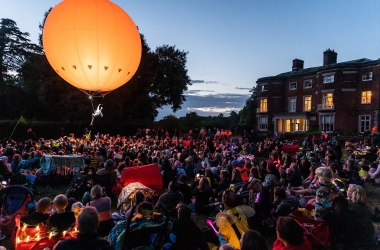Study by Wittenborg Researcher Analyses Attitude Changes in Festival Participants

Adam Jones' Book Chapter Proposes New Methodology Based on Participatory Research
Wittenborg Associate Professor Adam Jones is the co-author of a study proposing a new methodology for assessing changes in attitude among participants of community festivals. The work, co-authored with University of Brighton Senior Lecturer Mandy Curtis, was published as a book chapter titled ‘Measuring Attitudinal Change in Community Light Festivals’ in Routledge’s ‘Reimagining Community Festivals and Events’.
The chapter delves into the experiences of participants in two new community light festivals in the United Kingdom: Bexhill After Dark in East Sussex and University of East London (UEL) After Dark. Both events were designed to engage local communities in new and interactive ways, transforming familiar public spaces through performance, projection and street theatre. Their primary objective was not only to entertain, but also to foster a sense of community ownership and pride, as well as revitalise the areas where they were held. Moreover, both festivals were firmly grounded in community participation and audience development.
Held in 2022, the first Bexhill After Dark festival attracted an audience of 12,000 and was successfully delivered by the local events company 18 Hours. Later, the organisers were approached by the University of East London (UEL) to develop a similar event involving multiple university departments, students and the wider community. A UEL student committee was formed and played an active role in organising the University of East London After Dark festival.
According to Jones, while many have researched event experience in terms of motivation and satisfaction, attitudes to events have not received the same level of attention. “The approach taken in this research is an evaluation process linked to expectation, with participants’ attitudes being measured before and after their participation in the festival,” he highlighted.
The researcher added that the primary assessments of events and festivals are economic evaluations, with quantitative metrics used as the main vehicle to assess their value within policy contexts. “This hegemony of economic impacts is challenged with a desire to understand the social impacts of events and festivals. Due to their novel qualities on personal, social, cultural and political as well as economic aspects of people’s lives, there is a need to develop methods that evaluate the totality of the contribution they make.”
Through the method of participatory research, conducted in partnership with the community organisations responsible for organising the light festivals, the authors selected diverse groups of participants. For Bexhill After Dark, these included mobility scooter users, local skateboarders and young neurodivergent individuals, while the other group consisted of university students at all levels who were part of the UEL After Dark organising committee.
To collect data for the study, the researchers used a mixed-methods approach that included having participants express their expectations through writing or drawing, sorting photographs, ranking statements and voting on them. Moreover, the authors also relied on observation, note-taking and recording the output from the activities, including group discussions. The data was collected before, during and after the festivals to ensure that participants’ evolving attitudes were tracked.
The findings show raised awareness and a positive change in attitudes towards the value of events for local engagement through community festivals. There was an increased understanding and appreciation by participants of the benefits of community festival evidenced through their energy and enthusiasm before and after participation, their contributions and the sophistication of language in their discussion. After participation, they wrote considerably more and contributed a greater number of points. One of the main points highlighted by participants was that to gain community support, event organisers should plan to support all forms of accessibility, irrespective of economic constraints or physical ability.
However, the research also outlines that, despite participation in the festival, there is still limited understanding of the time and effort involved in delivering events, with no significant change in attitudes toward the positive cultural regeneration and employment opportunities provided by community events. There remains an attitude that community festivals are a volunteer-led activity that does not provide any significant skills, artistic and professional development, or employment opportunity.
Jones underlined that using participatory research comes with its challenges, such as ensuring that community members and community-based organisations are empowered as equal partners in planning and conducting the research. “There needs to be a concerted effort to ensure that there is an appropriate mix of participants and that the space and place provide a supportive, non-judgmental equitable opportunity for inclusion. Despite these concerns, the benefits of participatory research are the possibility of meaningful, empowered, co-created accounts that address critical community festival matters, find possible solutions and support better, more grounded inclusive policy and decisions,” he concluded.
WUP 23/06/2025
by Ulisses Sawczuk
©WUAS Press